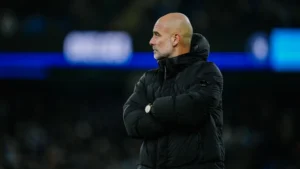The Club World Cup is a financial opportunity that could quietly tilt the balance of power in the Premier League
This summer two Premier League heavyweights, Chelsea and Manchester City, will be chasing glory at the newly expanded FIFA Club World Cup. They’ll be competing for a lucrative prize of $1bn, with the winner’s cheque potentially worth up to $125m (£97m).
In an era when even the richest clubs in England face scrutiny over financial sustainability, just how significant will that sum be for either City or Chelsea, if they were to win it?
Around half of FIFA’s $1bn prize pool will be shared among the 32 teams attending the gold rush. European clubs will be guaranteed between $12.8m and $38.2m just for turning up. The other half will go to clubs based on performance in the tournament. Wins, draws, surviving a knock-out round, they all come with a nice pat in the back pocket, with a club able to win potentially around $87m depending on how far they progress.
Put simply: if Chelsea or City make a deep run and win the whole thing, they could walk away with upwards of $125 million. That figure almost matches the current Champions League winner’s purse and is about half the total amount a team receives for playing an entire Premier League season and winning the title, once merit and broadcast share are combined.
The Club World Cup is not a minor revenue bump. It is a windfall.
For Chelsea, the timing could not be more fortuitous. After two turbulent seasons of heavy spending under the Todd Boehly-led consortium BlueCo, the club have operated under the ever-present shadow of the Premier League’s Profit and Sustainability Rules, and been forced to devise all sorts of inventive solutions.
A deep run in the Club World Cup would give the club a financial cushion heading into the 2025-26 season, allowing them to balance their books and re-enter the transfer market with greater freedom. The tournament would offer a substantial injection of cash without Chelsea needing to sell players, for example. Also, no complex accounting gymnastics like selling their women’s team to themselves required.
“All of a sudden you’re in a much better position than other clubs in the Premier League who didn’t participate in the tournament, because you have £100m to bring in more players,” said Chelsea legend John Mikel Obi. He knows, he knows.
For Manchester City, the context is a little different. Their recent signing of Tijjani Reijnders from AC Milan has taken total spending in 2025 alone to £288m. The club have had a healthy net spend in the past due to being able to move on players at good value. Just last summer City made in excess of £100m on departures, including the likes of Julian Alvarez, Joao Cancelo, and Taylor Harwood-Bellis.
So they are operating comfortably within the bounds of PSR. The significant concern for supporters of other teams is if that cash they are circulating was illegally injected into the club in the first place. This is reinforced by the ongoing legal uncertainty surrounding their 115 (or 130) alleged breaches of Premier League rules. It’s still unclear what the final outcome of that case will be.
However, if City are able to flex their financial muscles even within the current pressures of PSR, imagine what they can do with a windfall that essentially gives them – along with Chelsea – an advantage similar to having played one more Premier League season than the rest of their domestic rivals, at least in financial terms.
For sure, football has completed its metamorphosis. It’s moved away from an era where it’s just 22 men going at each other and a crowd baying for blood and hoping they win the trophy. Now it’s 22 men going at each other and a crowd baying for blood and hoping they win the trophy, and then checking their phones afterwards to know how much this competition is worth. Scroll, scroll, all right – how many top players does it mean we can sign next summer?
Clubs like Arsenal, Liverpool, Manchester United and Tottenham, none of whom are participating in the Club World Cup, will miss out on this financial bump. And the next one isn’t coming until four years. In a league of close margins, that’s a hell of an advantage. In squad terms, it’s essentially worth two additional top players, or one really expensive one from Bayer Leverkusen.
Money of course doesn’t guarantee success, but everybody knows it certainly plays a big role.




